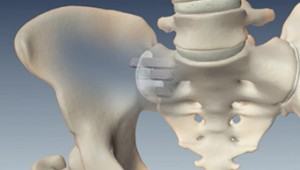 Treatments can vary depending on the severity of your symptoms and how much they limit your everyday activities. Below are some of the treatment options you may want to discuss with your doctor, depending on your symptoms.
Treatments can vary depending on the severity of your symptoms and how much they limit your everyday activities. Below are some of the treatment options you may want to discuss with your doctor, depending on your symptoms.
Nonsurgical Treatment for Sacroiliac Joint Disorders
As a first line of treatment, your doctor may prescribe any one or more of the following:
- Medications like non-steroidal anti-inflammatory drugs may help relieve pain and reduce inflammation.
- Physical therapy can help provide strengthening and pelvic stabilization exercises to reduce the movement in the SI joint.
- SI belt wraps around the hips to help squeeze the sacroiliac joints together. This supports and stabilizes the pelvis and sacroiliac joints.
- SI joint injections can reduce inflammation and relieve the pain.
Surgical Treatment of Sacroiliac Joint Disorders
If symptoms persist due to instability, your physician may recommend stabilizing your joint with sacroiliac joint fusion.
Sacroiliac Joint Fusion with the iFuse Implant System®
The iFuse Implant Systemis a minimally invasive option for patients suffering from sacroiliac joint disorders, including SI joint disruptions and degenerative sacroiliitis.
The iFuse procedure takes about an hour and involves three small titanium implants inserted surgically across the sacroiliac joint. The entire procedure is done through a small incision, with no soft tissue stripping and minimal tendon irritation. Patients may leave the hospital the next day after surgery and can usually resume daily living activities within six weeks, depending on how well they are healing and based on physician’s orders.
The iFuse procedure offers several benefits compared to traditional sacroiliac joint surgery:
- Minimal incision size
- Immediate post-operative stabilization
- Minimal soft tissue stripping
- Potential of a quicker recovery
iFuse Implant System Indications and Risk Statement
The iFuse System is intended for sacroiliac joint fusion for conditions including sacroiliac joint disruptions and degenerative sacroiliitis. As with all surgical procedures and permanent implants, there are risks and considerations associated with surgery and use of the iFuse Implant. You should discuss these risks and considerations with your physician before deciding if this treatment option is right for you.